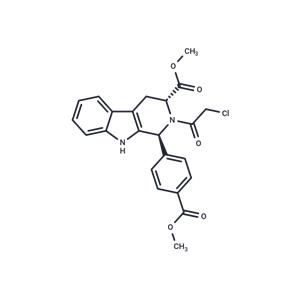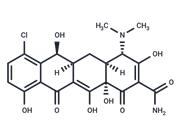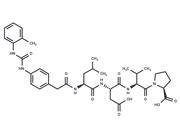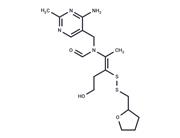| Name | RSL3 |
| Description | RSL3 (RSL3 1S) is an inhibitor of GPX4, and inhibits system xc- that blocks GSH synthesis (IC50=100 nM). RSL3 is a VDAC-independent activator of ferroptosis that is selective for tumor cells carrying oncogenic RAS. |
| Cell Research | TERT/LT/ST/RASV12 cells are seeded in 10 cm dishes and treated with 1 µM staurosporine, 10 µg/ml erastin, 20 µg/ml RSL5, and 1 µg/ml RSL3 for 16 hr. Both dying cells and live cells in each 10 cm dish are harvested and collected in the same 15 ml tubes by centrifuging cell suspension at 1000 rpm for 5 min. (Only for Reference) |
| In vitro | METHODS: Human hepatocellular carcinoma cells HepG2, HA22T/VGH were treated with RSL3 (0.1-10 μM) for 72 h, and cell growth inhibition was detected by MTT.
RESULTS: RSL3 dose-dependently inhibited the growth of HepG2 and HA22T/VGH cells, with an IC50 of about 0.07 μM for HepG2 cells and 0.3 μM for HA22T/VGH cells. [1]
METHODS: Human glioblastoma cells U87 and U251 were treated with RSL3 (0.25 μM and 0.5 μM) for 24 h, and the expression levels of target proteins were detected by Western Blot.
RESULTS: RSL3 treatment induced a decrease in the expression of ferroptosis-related proteins GPX4, ATF4 and xCT, and an up-regulation in the expression of HO-1 in U87 and U251 cells. [2]
METHODS: Human colorectal cancer cells HCT116 and LoVo were treated with RSL3 (3 μM) for 24 h. Labile iron pool (LIP) and ROS intracellular levels were analyzed by Flow Cytometry.
RESULTS: RSL3 promoted the increase of LIP and accumulation of ROS associated with ferroptosis. [3] |
| In vivo | METHODS: To test the antitumor activity in vivo, RSL3 (100 mg/kg in 20 μL DMSO plus 80 μL corn oil) was intraperitoneally injected into NSG mice bearing human prostate cancer tumors DU145 or PC3 twice a week for sixteen days.
RESULTS: RSL3 treatment significantly inhibited the growth of human prostate cancer tumors, indicating antitumor activity in vivo. [4]
METHODS: To detect anti-tumor activity in vivo, RSL3 (1 mg/kg) and cetuximab (13 mg/kg) were intraperitoneally injected once a week for sixteen days into BALB/c nude mice harboring KRAS-mutant human colorectal cancer tumor DLD-1.
RESULTS: RSL3 treatment significantly inhibited the growth of KRAS-mutant tumors. Cetuximab enhanced RSL3-induced ferroptosisby activating p38 MAPK and inhibiting the Nrf2/HO-1 axis, which further inhibited tumor growth. [5] |
| Storage | Powder: -20°C for 3 years | In solvent: -80°C for 1 year | Shipping with blue ice. |
| Solubility Information | 10% DMSO+40% PEG300+5% Tween 80+45% Saline : 4.41 mg/mL (10 mM), Please add co-solvents sequentially, clarifying the solution as much as possible before adding the next one. Dissolve by heating and/or sonication if necessary. Working solution is recommended to be prepared and used immediately.
DMSO : 45 mg/mL (102.07 mM)
|
| Keywords | inhibit | Ferroptosis | RSL-3 | (1S,3R)-RSL3 | Inhibitor | RSL3 | Glutathione Peroxidase | RSL 3 |
| Inhibitors Related | TBHQ | Acetylcysteine | Butylated hydroxytoluene | α-Vitamin E | Sorafenib | Curcumin | Artemisinin | L-Cystine | L-Glutamic acid monosodium salt | Coenzyme Q10 | 5-Aminosalicylic Acid | Melatonin |
| Related Compound Libraries | Apoptosis Compound Library | Cysteine Covalent Library | Target-Focused Phenotypic Screening Library | Bioactive Compound Library | Inhibitor Library | Metabolism Compound Library | Anti-Aging Compound Library | Bioactive Compounds Library Max | Covalent Inhibitor Library | Anti-Cancer Active Compound Library |

 United States
United States



